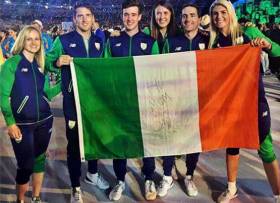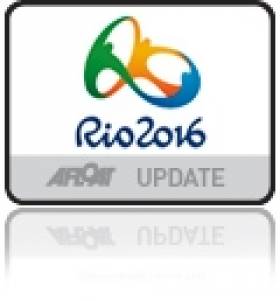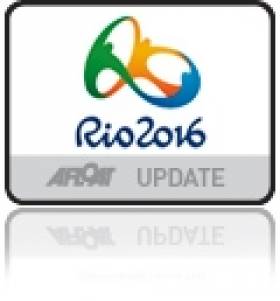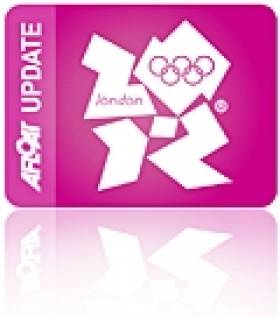Displaying items by tag: annalise muprhy
Rio Storm Before Olympic Sailing Starts, Moderate Winds for First Laser Races Forecast
As Irish Laser sailors Annalise Murphy and Finn Lynch, both of the National Yacht Club, prepare for their first race of the Olympic regatta later today, the Olympic sailing venue saw 40 knots of wind blast out of nowhere and hit the sailing race track from the south-west. With sand whipping across Flamengo Beach, it was an eye-watering reminder that in Rio, you really do have to be prepared for anything. An Angolan 470 ventured out for some high-wind practice, but no one else was showing much interest. With less than 24 hours before the RS:X Men and Women kick off the Olympic Sailing Competition, along with the Laser and Laser Radial, this was not the right time in the four-year cycle for putting bodies and equipment in jeopardy.
Chang Hao is representing Chinese Taipei in the RS:X Men. "My plan was to go sailing today but the wind was too strong so I am just relaxing. I'll set up my equipment and go back to the apartment and take some rest. My first Olympics was 2008, when I was 17. This is my third Olympics, so I'm getting old. But I hope I can go to five Olympics, that's my dream. This time the sailing is close to the city, which is great. I hope i can go and watch other sports, the rugby, the cycling maybe.”
Later on in the afternoon the breeze dropped away to almost nothing. The calm after the storm. The forecast for Monday and the first day of competition looks favourable, with moderate winds and sunny skies on the cards. It could be a perfect way to get things started and calm the nerves after all the tension, the hype and the build-up to this hotly anticipated contest. For local fans in Rio, they will be watching Robert Scheidt open his campaign in the Laser. Can the poster boy (aged 43) of Brazilian sailing write a new chapter in Olympic history and win a record sixth medal?
Meanwhile, there are those looking to make their first mark on the Olympics, such as Alisa Kiriliuk, helming Russia's entry in the women's 470. "This is my first time at the Games but I am not too nervous. My father, Andrei, went to three Olympic Games in the Laser, Soling and Tornado. He is helping me very much. His message to me is: Don't be afraid, just smile, relax, have fun and do what you normally do.”
Arantza and Begoña Gumucio have been sailing together for most of their lives and now the sisters are sailing for Chile in the 49erFX. "It's incredible to be at our first Olympics, and we are loving every moment,” said Arantza. Begoña chimes in, "We're staying in the Olympic Village, sharing a room and soaking up the atmosphere. And when we're out on the water, the local fisherman shout out 'Chile, Chile!' This feels like a home Games for us, we have the South American connection with our friends in Brazil, so we are going to enjoy this a lot.”
For most teams, the first race can't come soon enough. The Nacra 17 fleet, however, is one of the last to start. One team that might be happy about that is the Greek duo of Sofia Bekatorou and Michalis Pateniotis. "We have been sailing together as a team for just four months, so we are still in our honeymoon period,” said Bekatorou of her young partnership with Michalis Pateniotis. Every moment on the water counts for the Greek duo who are being coached by Anton Paz, winner of a gold medal in the Tornado catamaran for Spain, at the 2008 Games. Bekatorou won gold in the 470 at Athens 2004 and bronze in the Yngling at Beijing 2008. Pateniotis has yet to win an Olympic medal. "Working with Sofia it is easy to see how she has achieved so much in her career,” says Pateniotis. "When she sets a goal, she goes all out to get it. We would have liked more time to get ready but we have worked hard for the short time we have been sailing together. We are as ready as we are going to be now.”
Giles Scott was good enough to win a medal four years ago at London 2012. But the Briton had to bide his time as Ben Ainslie was selected for his fifth Olympic Games. Great Britain has won the gold medal in the Finn going back to Iain Percy's victory in Sydney 2000, so there is a sense of expectation around Scott, the four-time World Champion. "For me this moment has been a long time coming, a long old road. In a way it's odd to be so close to it. We've done a lot of hard work to get to this point, and now I just want it to get started. I've done as much research as I can into what to expect, talking to people who have been to the Games before. As of now, it's been how I expected, with more media interest, the measurement and so on, but it feels quite comfortable. Today we have seen a lot of wind. It's a reminder that you could easily have two weeks of no wind and you could easily have two weeks of 20 knots, so you really do have to be ready for everything.”
No matter how much people tell you to try and treat the Olympics is 'just another regatta', Annette Viborg of Denmark believes it's just not possible. Sailing with Allan Norregaard in the Nacra 17 Mixed Multihull, Viborg commented, "The Olympics is even more crazy and mad than I expected. The regulations say that you can only go training at certain times. Everything is very tensed up before the Games. But we know that it's time to bring it on. Game time.”
Reportage by Andy Rice - World Sailing
Results / Entries
A full list of sailors racing at the Rio 2016 Olympic Games is available to view here. Results will be available on World Sailing's Olympic Website when racing starts on Monday 8 August here
Live Tracking
The racing will be available to watch in 2D and 3D via the live tracking. Live tracking will be available when racing commences here
Live Tracking via the Sailviewer-3D Tablet App will be available for devices with 7" or greater screens.
Click here to download the iOS Application
Click here to download the Android Application
www.sailing.org/olympics/
ISAF World Sailing Rankings Released, Annalise Murphy Ranked 15th
#isaf – The ISAF World Sailing Rankings for 2 February 2015 have been released. Irish Laser radial sailor Annalise Murphy, who placed seventh overall in Miami last week, is ranked 15th, Belfast's lough's Ryan Seaton and Matt McGovern are world ranked 16th in the 49er skiff and club mate James Espey is 45th in the mens Laser division. Full rankings in all classes are here.
Laser
By his own standards, Tom Burton (AUS) was off the pace at ISAF Sailing World Cup Miami, Presented by Sunbrella, finishing down in 18th. However with a number of medal winning performances already behind him, he holds on to World #1.
Philipp Buhl (GER) claimed the World Cup Miami title but only after his nearest rival Nick Thompson (GBR) suffered an equipment malfunction that allowed the German to pass in the Medal Race. Buhl's victory gave him the full 200-points and he leapfrogs up from World #30 to World #7.
Thompson meanwhile moves up to World #2 as Robert Scheidt (BRA) slips to World #3.
Miami was a vital regatta for all of the competitors with valuable ranking points up for grabs. A top performance would prove significant and that was certainly the case for the 14th placed Jesper Stalheim (SWE) and the eighth placed Rutger van Schaardenburg (NED).
Stalheim picked up 175 points whilst van Schaardenburg received 186. They move back into the top 30 at World #20 and #21 respectively, securing an invitation to ISAF Sailing World Cup Hyères.
Alex Mills Barton (GBR) and Kristian Ruth (NOR) also sneak into the top 30 at World #29 and World #30.
Several 50-point regattas across the world also see chops and changes in the middle of the rankings.
Laser Radial
There is no change to the leading Laser Radial trio with the Miami podium finishers all solidifying their top position. Bronze medallist Marit Bouwmeester (NED) sits at World #1, silver medallist Evi Van Acker (BEL) is at World #2 and Anne Marie Rindom (DEN), Miami gold medallist, completes the top three.
There are plenty of movers and shakers below them with the 200-point ISAF Sailing World Cup Miami and several 50-point regattas ensuring so. With the top 30 receiving invitations to ISAF Sailing World Cup Hyères, the fight for position in Miami was fierce.
Alison Young (GBR) moves back into the top 30 after a busy period of racing. Wins at ISAF Sailing World Cup Melbourne and Sail Sydney combined with a ninth at the ISAF Worlds and a fourth at the Sailing World Cup Final had left her at World #38. A hard fought fifth in Miami pushes her back into the top places and she sits at World #18.
At the cut off point for Hyères invitations, Joyce Floridia (ITA) and Fernanda Decnop (BRA) both move into the top 30, counting the key points they secured at World Cup Miami. For Paloma Schmidt (PER), a 45th in Miami was not enough to solidify her position in the top 30 and she misses out by four points.
Finn
Ivan Kljakovic Gaspic (CRO) retained World #1 in the Finn following a silver medal performance at ISAF Sailing World Cup Miami. The Croatian has three consecutive second place finishes to his name, ensuring a sublime haul of points.
Giles Scott (GBR) holds a perfect ranking score of 800 points after he extended his winning streak in Miami. However, the Briton only counts five regattas to his ranking whilst those around him count six. Scott is positioned at World #7.
Zsombor Berecz (HUN) moves back into the top 30 after he won gold at the 50-point Palamos Christmas Race at the back end of 2014. The current World #30 takes the final Hyères invitation. Palamos silver medallist Milan Vujasinovic (CRO) also moves into the top 30. He is at World #20.
49erFX
Having dominated the 49erFX over the last 12 months, Martine Grael and Kahena Kunze (BRA) comfortably sit atop of the rankings on 988 points.
North American gold and a World Cup Miami bronze ensured their position was solidified and they are 69 points clear of World #2 Ida Marie Baad Nielsen and Marie Thusgaard Olsen (DEN).
Alex Maloney and Molly Meech (NZL) finished second at the Midwinters before sealing World Cup Miami gold with a day to spare. With the full 200 World Cup points coming their way they move up to World #3.
Interestingly, since the 49erFX's first ranking release on 12 December 2012, there have only been two World #1s, the Brazilians and Kiwis. But as crews continue to master the equipment, they'll look to spring some surprises on the road to Rio.
Tess Lloyd and Caitlin Elks (AUS) took the honours at the Oceanic Championship and continue to march up the rankings. They move up four places to World #14.
49er
ISAF Sailing World Cup Miami bronze was enough for Jonas Warrer and Anders Thomsen (DEN) to retain World #1 in the 49er. Joel Turner, sailing with Iain Jensen, picked up silver in Miami and as a result Turner moves from World #40 to World #18 and will receive a Hyères invitation for himself and usual crew Lewis Brake.
Turner came in for Nathan Outteridge who missed out on Miami competition for personal reasons. Jensen will revert back to sailing with his usual helm. Outteridge and Jensen sit at World #24 but only count four regattas to their point's total.
Nico Delle Karth and Nikolaus Resch (AUT) put together a steady string of Miami results that ultimately handed them the title. They did not win a race across the series of 13 but 11 top ten performances gave them the edge. They remain at World #3.
A 23rd in Miami was enough for Federico and Arturo Alonso (ESP) to re-enter the top 30 at World #27. Jacapo Plazzi and Umberto Molineris (ITA) move to World #30 after a 31st in Miami. Both crews will receive invitations to ISAF Sailing World Cup Hyères.
Men's 470
Mat Belcher and Will Ryan (AUS) retain World #1 in the Men's 470 after two medal winning performances in Miami, USA. They claimed the North American title in advance of ISAF Sailing World Cup Miami but were made to settle for silver at the main event. They sit 25 points clear of World #2 Panagiotis Mantis and Pavlos Kagialis (GRE).
Luke Patience and Elliot Willis (GBR) finished behind the Australians at the 100-point North American regatta but had their revenge by securing a seven point victory at World Cup Miami. As a result they shift up to World #3.
Japan's Tetsuya Matsunago and Yugo Yoshida are the big movers this month. The Japanese pair picked up bronze at the 470 North Americans before sealing a tenth at World Cup Miami. As a result, they have moved up to a personal best of World #5 from World #19.
Palamos Christmas Race silver medallists Guillaume Pirouelle and Valentin Sipan (FRA) sneak into World #30, thus securing an invitation to World Cup Hyères. At World #31 Antonio and Joao Rosa miss out on an automatic invitation by 24 points. Their chance to qualify will come at Princess Sofia Trophy regatta in Palma, Mallorca, Spain.
Women's 470
New Zealand's Jo Aleh and Polly Powrie move back to World #1 in the Women's 470 having dominated ISAF Sailing World Cup Miami, Presented by Sunbrella. Taking the full 200-points the Kiwis are 99 points clear of Fernanda Oliveira and Ana Luiza Barbachan (BRA).
Hannah Mills and Saskia Clark (GBR) finished 27 points off the Kiwis in Miami, however with a silver medal coming their way they move up to World #7 from World #21.
Lara Vadlau and Jolanta Ogar (AUT) took the gold at the 100-point North American Championship in advance of their ninth at the World Cup. They sit at World #11.
France's Maelenn Lemaitre and Aloise Retornaz took 50-points away from the Palamos Christmas Race regatta at the end of 2014 and remain at World #24.
There are no shock entries into the top 30 after many of the leading teams used Miami to solidify their spot top 30 status.
Men's RS:X
It was an up and down week in the Men's RS:X, with consistency a rarity on Miami's challenging track. Nonetheless, the form racers came to the forefront.
Dorian van Rijsselberge (NED) claimed gold which promotes him up to World #13 from World #29. Silver for Thomas Goyard (FRA) moves him up to World #3 a personal best and bronze medallist Byron Kokkalanis (GRE) retains World #1.
Sebastian Fleischer (DEN), Joan Cardona Bocarando (ESP) and Ivan Pastor (ESP) all move into the top 30 after solid Miami performances and subsequently qualify for ISAF Sailing World Cup Hyères.
The 100-point RS:X African Championship title went the way of Algeria's Hamza Bouras. The Algerian moves up to World #105, a personal best.
Women's RS:X
Flavia Tartaglini (ITA) holds on to World #1 in the Women's RS:X in spite of a disappointing final day in Miami. The Italian was on the course side in the Medal Race and dropped out of the honours. Nonetheless her fourth place was enough for her to retain her position at the top of the rankings.
The Netherlands' Lilian de Geus and Russia's Olga Maslivets were major benefactors of Tartaglini's downfall. De Geus took silver which pushes her up to World #4, a personal best, and Maslivets' bronze sees her climb up to World #25 from World #38 to secure a Hyères invitation.
Bryony Shaw (GBR) claimed a comprehensive Miami victory, solidifying her spot at World #2.
Nacra 17
Vittorio Bissaro and Silvia Sicouri (ITA) successfully defended their ISAF Sailing World Cup Miami title with a day to spare. By taking maximum points at the 200-point regatta they hold on to World #1.
Ben Saxton and Nicola Groves (GBR) took silver in Miami and remain at World #6. Billy Besson and Marie Riou (FRA) sneaked onto the Miami podium and sit at World #2.
Mandy Mulder and Coen de Koning (NED) finished fourth, moving them back into the top 30.
Irish Sailing's Sister Act Plan on Rio 2016
#RIO 2016 – It's well known that Annalise Murphy was barely off the water in Weymouth before she committed herself to a further few years sailing hard in the Laser Radial class for the 2016 Olympic Games in Rio de Janeiro.
What's probably less well known is that older sister Claudine has also set her sights on Brazil, campaigning in the new Olympic kitesurfing class.
News of the double campaign in the Murphy household was revealed in The Irish Times by Pamela Duncan prior to Annalise's medal race a week ago.
Claudine says there was "big rivalry" between her and Annalise as both pursued success in the Laser Radial, but they also realised that only one of them could represent Ireland in the class at Olympic level. Annalise showed the potential, and Claudine turned her hand to a different class.
“She’s my best friend in the whole world,” says Claudine, who flew in to support her sister from the Caribbean where she is already hard at work campaigning for a spot at the Rio Games in kitesurfing - a somewhat controversial addition to the Olympic schedule.
Meanwhile, Annalise Murphy and the Irish sailing team were welcomed home with a guard of honour at the National Yacht Club in Dun Laoghaire yesterday evening.
Annalise also announced plans to take things relatively easy for the next year, returning to UCD next month for a science degree.
"I deferred it three years ago as I didn’t want to put a half-hearted approach into college or sailing," she said. "I’m older now and I feel like I can manage things better.”
Ireland Guaranteed Medal in the Star Class Today (Podcast here)
Ireland is guaranteed a medal today at the British Skandia Sail for Gold regatta in the Star class but Peter O'Leary's clean run in the keelboat this week was not without drama yesterday when his crew Fritjof Kleen slipped overboard 300 metres from the finish line.
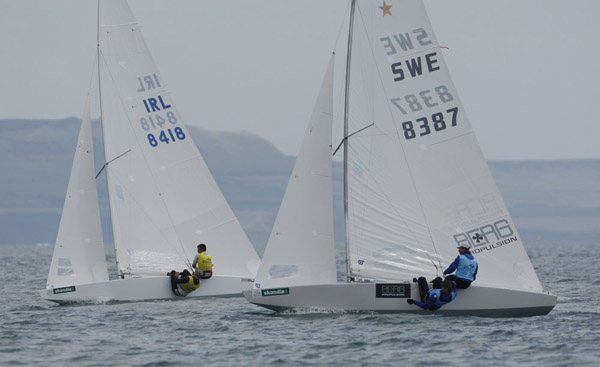
Peter O'Leary and Frithjof Kleen (IRL) against Fredrik Loof and Johan Tillannder (SWE) in the Star class on day 5 of the Skandia Sail for Gold Regatta. Photo: onEdition



























